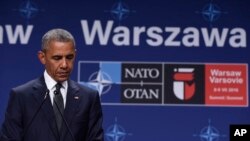The killings of five police officers in the southwestern U.S. city of Dallas are prompting President Barack Obama to cut short his trip to Europe by one day.
The decision did not change the U.S. leader's plans at the NATO summit that was concluding Saturday in Warsaw, where the group agreed on new efforts to deter Russia from threatening member states on the alliance's eastern flank.
"The president has accepted an invitation from Dallas Mayor Mike Rawlings to travel to Dallas early next week," said White House spokesman Josh Earnest, in a statement issued early Saturday.
"Later in the week, at the White House, the president will continue the work to bring people together to support our police officers and communities, and find common ground by discussing policy ideas for addressing the persistent racial disparities in our criminal justice system," Earnest said.
Obama travels to Spain as scheduled Saturday but will skip a stop in Seville where he was to visit the city's cathedral and its royal palace, and meet with King Felipe. On Sunday, Obama is to speak to U.S. troops at a naval station in Rota on the Mediterranean Sea.
Russian aggression
His decision to stay through the end of the summit and go to Spain for at least enough time to visit U.S. troops at Rota underscores the importance of the moment. U.S. officials say the NATO summit marks a turning point in which NATO is shifting its focus from reassurance to deterrence.
The president announced Friday that the U.S. will send nearly 1,000 troops to Poland as part of what officials said is a modest force intended to deter Russian aggression.
NATO members also agreed to additional deployments in the Baltic states of Estonia, Latvia and Lithuania, as part of what NATO officials said is the alliance's largest deployment since the end of the Cold War.
The decision to boost rapid response forces follows pressure by leaders of the Baltics, which analysts say are especially vulnerable to Russian aggression. Defense analysts say recent studies show Russian forces could take any one of the Baltic capitals within 60 hours.
The experience of Ukraine weighed heavily on NATO's shift in posture.
Much of Obama's attention Saturday was on Ukraine, where Russia is showing no signs of ending its intervention after more than two years.
Before departing for Spain, Obama was to meet with leaders of main NATO allies Britain, France, Germany and Italy, plus Ukraine's President, Petro Poroshenko.
Afghan violence
The other focus of the summit Saturday was Afghanistan, where Obama recently said the United States will keep 8,400 troops through the end of his presidency in January.
One of the aims of the summit was to secure commitments from NATO members to stem rising violence in Afghanistan. The U.S. has budgeted nearly $3.5 billion to aid Afghan forces.
NATO Secretary-General Jens Stoltenberg said Saturday that other members have committed $1 billion to the Afghan effort.




